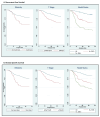The Association of Ethnicity and Oncologic Outcomes for Oral Cavity Squamous Cell Carcinoma (OSCC)
- PMID: 38893235
- PMCID: PMC11171403
- DOI: 10.3390/cancers16112117
The Association of Ethnicity and Oncologic Outcomes for Oral Cavity Squamous Cell Carcinoma (OSCC)
Abstract
(1) Background: To compare oncologic outcomes of South Asian (SA) patients treated for oral squamous cell carcinoma (OSCC) to the general population. (2) Methods: Adult patients who underwent surgical resection of OSCC +/- adjuvant treatment between 2009 and 2022 (N = 697) at a regional cancer centre in Canada were included. SA patients, identified using a validated method, were compared to non-SA patients. Kaplan-Meier methods were used to compare the primary outcomes, disease-specific survival (DSS) and recurrence-free survival (RFS) across baseline univariate characteristics, including betel nut consumption. Median follow-up time was 36.4 months. Cox proportional hazard models were used to identify independent predictors of survival with significance set at p < 0.05. (3) Results: SA patients (9% of cohort, N = 64) were significantly younger and had lower rates of smoking and alcohol consumption compared to non-SA patients (p < 0.05). SA patients had a two-fold higher risk of recurrence and significantly worse disease-specific survival, even after adjusting for stage and high-risk features [RFS: HR 2.01 (1.28-3.14), DSS: HR 1.79 (1.12-2.88)]. The consumption of betel nut was not associated with outcomes. (4) Conclusions: SA patients had significantly worse oncologic outcomes, even after controlling for known predictors of poor prognosis. These findings are novel and can inform personalized treatment decisions and influence public health policies when managing patients with different ethnic backgrounds.
Keywords: South Asian; betel nut; ethnicity; head and neck cancer; oral cancer; oral squamous cell carcinoma (OSCC).
Conflict of interest statement
The authors declare no conflicts of interest.
Figures



Similar articles
-
Lymph node density as a prognostic predictor in patients with betel nut-related oral squamous cell carcinoma.Clin Oral Investig. 2018 Apr;22(3):1513-1521. doi: 10.1007/s00784-017-2247-3. Epub 2017 Oct 17. Clin Oral Investig. 2018. PMID: 29038963 Free PMC article.
-
Outcome and treatment toxicity in east-indian versus white-canadian patients with oral cavity cancer following postoperative (chemo-)radiotherapy delivered under similar multidisciplinary care: A propensity-matched cohort study.Oral Oncol. 2021 Sep;120:105419. doi: 10.1016/j.oraloncology.2021.105419. Epub 2021 Jun 25. Oral Oncol. 2021. PMID: 34175612
-
[Correlation of betel nut chewing and clinicopathologic factors of oral squamous cell carcinoma].Shanghai Kou Qiang Yi Xue. 2021 Jun;30(3):268-272. Shanghai Kou Qiang Yi Xue. 2021. PMID: 34476443 Chinese.
-
Temporal and spatial patterns of recurrence in oral squamous cell carcinoma, a single-center retrospective cohort study in China.BMC Oral Health. 2023 Sep 19;23(1):679. doi: 10.1186/s12903-023-03204-7. BMC Oral Health. 2023. PMID: 37726764 Free PMC article.
-
Prognostic Significance of a Scoring System Combining p16, Smoking, and Drinking Status in a Series of 131 Patients with Oropharyngeal Cancers.Int J Otolaryngol. 2021 Sep 7;2021:8020826. doi: 10.1155/2021/8020826. eCollection 2021. Int J Otolaryngol. 2021. PMID: 34531914 Free PMC article. Review.
Cited by
-
Survival outcomes and contributing factors in oral squamous cell carcinoma patients in Khuzestan province, southwest of Iran.Front Oncol. 2024 Dec 16;14:1472190. doi: 10.3389/fonc.2024.1472190. eCollection 2024. Front Oncol. 2024. PMID: 39737408 Free PMC article.
References
LinkOut - more resources
Full Text Sources

